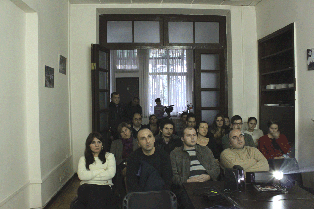Sopo Getsadze
On December 10, the Human Rights Center screened a documentary film War Don Don at the Human Rights House Tbilisi. The film by Rebecca Richman Cohen is about the international justice and its dilemmas when working on the cases of concrete people and countries. The Royal Netherlands Embassy provided the Human Rights Center with the film.
The film is about a civil war in Sierra Leone – West African Country – where a rebel organization “RUF” was set up to overthrow the legitimate authority. The RUF members killed or cut off limbs of people in the name of improvement the lives of Sierra Leonean population. After a long civil war, the organization member started disarmament based on the initiative of its interim leader Issa Hassan Sesay. The Special Court of Sierra Leone judged the RUF leaders. According to the film, the court imposed the strictest punishment on Issa Hassan Sesay who tribute to the peacebuilding process.
The film War Don Don demonstrates the problems of the international justice which originate with regard to concrete people; it shows how many people remain unpunished regardless the crimes they have committed. Most of them relocate to another country which finally hinders the justice to render.
The guests pointed out during the discussion after the film that the problem of Sierra Leone is urgent in other countries too. They said the judiciary systems are being improved in other countries too where international institutions should also be developed which will be able to estimate the mechanisms of investigation and punishment. Besides that, everybody agreed that cooperation between states and extradition of criminals to partner countries is very important for the restoration of justice.
The audience recalled the past twenty year’s history of Georgia–Civil War and frozen ethno-conflicts. “This film somehow demonstrates the recent facts and situation in Georgia. There were armed conflicts in concrete regions of Georgia; thousands of people were killed; however, nobody, who launched those conflicts, has been punished yet. By judging them we could have avoided many other crimes. Several people should be punished for such serious crimes because punishment is a mechanism which will in future avoid similar crimes, controversy between countries and armed conflicts,” said the moderator of the evening and the executive director of the Human Rights Center Ucha Nanuashvili.
The editor-in-chief of the online newspaper of the Human Rights Center www.humanrights.ge Aleko Tskitishvili said that Georgia has went through bloody conflicts and several civil wars for the last twenty years; more precisely, the so-called Tbilisi War, bloody controversy in the Western Georgia, conflict in South Ossetia, the wars of 1998, 2004 and 2008 in Abkhazia and South Ossetia where ten thousands of people were killed.
“30 000 people were killed on the Georgian side only in the armed conflict in Abkhazia at the beginning of the 1990s. Nobody cares about the casualty the Abkhaz side. Several people were punished in Sierra Leone while nobody was punished in Georgia for the same crimes. Kitovani is teaching us lessons from Moscow; Jaba Ioseliani was buried in the Didube Pantheon together with public figures; Shevardnadze has retired and enjoys himself by writing memoirs. Nobody judged them as well as those separatists who also committed war crimes. I think, those people were to be punished too,” said Aleko Tskhitishvili.
The representatives of the Royal Netherlands Embassy took active part in the discussion. They said evaluation of the history is very important but decision-making process is a very sensitive case. We should consider everything very carefully and foresee the impacts of our decisions on frozen conflicts – in order not to escalate new armed conflicts.
News
December 13, 2023
Ethnic minorities outside the peace dialogue
November 6, 2023
‘Peace’ agenda of political parties
Popular
Articles
February 13, 2024




